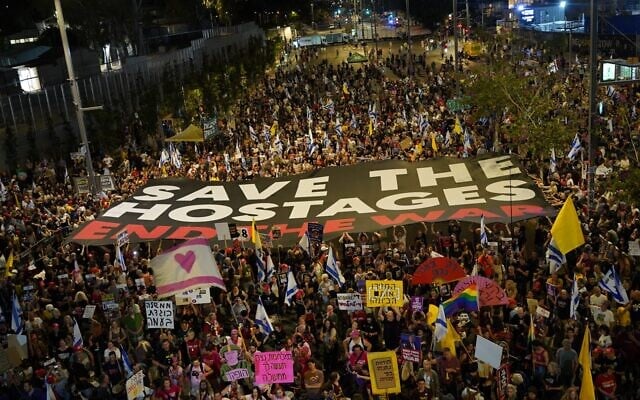Do street protests matter?
Many people in the UK are still stung by how gigantic demonstrations two decades ago could not stop Tony Blair from joining the US-led invasion of Iraq.
And today in Israel, people are surely feeling something similar, as weekly mass protests led by families of the hostages held by Hamas, seem to be going nowhere. The far right government is stubbornly proceeding with its plans to destroy Gaza, building by building and brick by brick, as Palestinians die in their thousands.
Something similar is happening in Georgia, where a government controlled by the billionaire Bidzina Ivanishvili is facing unprecedented and ongoing mass protests in the capital city of Tbilisi and across the country. But those protests seem to be having little effect.
So why do it? Aren’t street protests a waste of time and energy?
Protests are not just about getting a government to bow to pressure, though that sometimes happens. The main reason to organise street demonstrations and marches is to raise awareness — and to build the movements and political parties that can take the struggle to the next stage, which is the fight for political power.
In Israel, Netanyahu’s proposed judicial reforms were stopped in their tracks by massive street protests and the Histadrut labour federation played a key role by shutting down the country with targetted strikes. By the time Hamas launched its attack on 7 October 2023, the Netanyahu government was tottering and may not have survived. The war has given it new life.
In Georgia, early attempts by the government to pass legislation modelled on Putin’s “foreign agents” laws were initially defeated by very large demonstrations in the streets. By the end, even Georgia’s main trade union federation had taken the side of the demonstrators. The government was caught unawares and withdrew the proposed law, but sooned learned lessons from their defeat.
Meanwhile, public opinion polls in Israel continue to show widespread anger at the government over its failure to get the hostages released and its failure to protect the country’s borders on 7 October. Many Israelis believe that Netanyahu and his cronies are corrupt and are motivated solely by the desire to remain in power and out of jail. In recent years, both an Israeli prime minister and a president served jail time, so Netanyahu knows that the only way he remains a free man is if he remains in power.
The ongoing street protests in Israel, sometimes with hundreds of thousands of supporters, are laying the basis for a broad coalition government following the next elections — a government which will be committed to ending the war, among other things.
The street protests in Georgia began in response to what were widely seen as rigged elections a year ago. They grew massively once the ruling Georgian Dream party announced the effective end of efforts to join the European Union. Since then, Rustaveli Avenue, the main thoroughfare in Tbilisi has seen almost daily protests. The government response has been to jail opposition leaders and shut down independent media, copying from Vladimir Putin’s playbook while also growing closer to the Russian dictator.
While opposition parties in Georgia are divided about whether or not to participate in upcoming municipal elections, they are united in their opposition to the undemocratic and anti-Western politics of the government. If they can use the ongoing protests in the streets to build unity and focus on political change, they may be able to re-create something like the Rose Revolution of 2003. That event brought down the autocratic post-Soviet government of Eduard Shevardnadze and ushered in an era of greater openness and democracy.
In the end, it comes down to a struggle for political power. That’s the only way to bring about real change in a country. Street protests are important because they raise awareness and serve as recruiting grounds for organised opposition parties.
On their own, the street demonstrations in Israel and Georgia are unlikely to persuade the right-wing governments in those countries to change course. But when Netanyahu is finally ousted from power, and when Ivanishvili and his Georgian Dream lose their grip, we will be able to look back and say: here, in the streets, the revolution began.
This article appears in this week’s issue of Solidarity.
